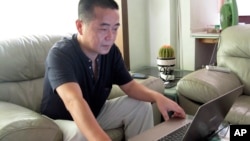In recent weeks, hopes have been dashed for the mothers of two jailed Chinese rights defenders to reunite with their sons – Liu Feiyue and Huang Qi – during this week’s Lunar New Year holidays.
Last Tuesday, after a court in Hebei sentenced her son Liu Feiyue to five years in jail for "inciting state subversion" his mother Ding Qihua broke her silence. Liu is the founder of the Civil Rights and Livelihood Watch website.
Along with the sentence, the 48-year-old citizen journalist was also fined 1.01 million yuan (US$149,700), a punishment the Chinese Human Rights Defenders group called the harshest measure the Chinese government has taken in its war on civil society organizations that promote human rights, rule of law and democracy.
Making a Deal with the Devil?
Previously Ding had worked with authorities to try and convince her son to admit his guilt. Ding said she now regrets having made a deal with local court officials and police in the case in exchange for her family’s silence and her efforts to reform her school teacher-turned-activist son.
Last week she posted a letter online, revealing details of what had happened.
“They tricked us into assisting them with undergoing [ideological] work [on Liu] so that my son would be given a suspended sentence. But they have broken the promise and handed the heaviest five-year sentence. We’re extremely angry now and prepared to appeal,” Ding told VOA.
She added that ahead of Liu’s trial in August last year, the family was naively preparing for Liu’s release, acting on an empty promise of a lenient treatment.
Ding now takes pride in her son’s integrity and courage to speak up against injustice.
She said her son has done nothing wrong but to publish reports of rights abuses in China.
Courage to Speak Up
Upon hearing the court’s verdict, “he was very emotional. He yelled to the court ‘this is tyranny, dictatorship and political persecution.’ He has insisted in his innocence. Even if we’ve tried to persuade him into pleading guilty, he firmly believes in his heart that he’s not guilty,” said the 76-year-old mother.
VOA’s calls to Cheng Xiang-lin, spokesman of the Hebei province’s Suizhou Intermediate People's Court, for comments went unanswered.
One lawyer, who spoke with VOA on the condition of anonymity, said Liu’s appeal of the case will only serve as a symbolic rebuttal to the ruling of the court, which is controlled by the Communist Party and will never revise its sentencing on those who are critical of the one-party state.
Liu was arrested in November of 2016 and is scheduled for release in 2021.
The Strongest Advocate
Unlike Ding, cyber activist Huang Qi’s mother Pu Wenqing has been a strong advocate of her son’s innocence and what she calls his politically-motivated trial.
She has repeatedly made sure that her grave concerns over her son’s deteriorating health in jail were heard.
And she constantly talked to media, revealing details of her son’s case or progress of his trials in writing or video clips online.
She also petitioned the court and called on the Communist Party to fully investigate.
She said she was once questioned on a 10-hour train ride from Sichuan to Beijing and violently shoved down to the ground at a Beijing train station by interceptors, who found out her goal of appealing to China’s leaders to release her son.
After a detention of more than two years, Huang, who founded the 64 tianwang (Skynet) rights website, was reportedly put on trial after a closed-door hearing last month.
Huang, along with Chen Tianmao and Yang Xiuqiong, has been accused of leaking state secrets to foreign entities – an ill-defined charge often used by the Chinese authorities to clamp down on dissent.
Prior to the hearing, Pu disappeared with her whereabouts remaining unclear.
Although Huang’s verdict has yet to be announced, his mother’s choice to be vocal about her son's case has been the best policy, which not only allows the truth to speak for itself in face of political intimidation, but also keeps a tab on the authorities’ power abuse, said Patrick Poon, China Researcher at Amnesty International in Hong Kong.
“That’s exactly what the Chinese authorities want to make people feel, if you speak up, then you’ll face more consequences. But in reality, we see, public pressure [and] international pressure would help instead of giving [it a] negative impact,” he said.
Keeping a Tab on Power Abuse
Poon said that Li Wenzu, wife to detained rights lawyer Wang Quanzhang, is another example of such open vocal pressure.
Li has long been determined to expose all the harassment and pressure from the state security to restrict her freedom of expression while putting her husband’s unfair trial and treatment under public scrutiny, he said.
By doing so, it is believed that Wang, a lawyer who defended political dissidents, was given a more lenient verdict last Monday, when a court in Tianjin sentenced him to four and a half years in prison for state subversion.
Wang was the last tried among those who were arrested during China’s crackdown on rights lawyers in July 2015, and may be released in early 2021.
Along with the U.S. government, many international rights groups have denounced China’s arbitrary verdicts on many of its rights defenders and called on the immediate release of Wang, Huang and Liu.
“We remain concerned by the deteriorating situation for the rule of law, human rights, and fundamental freedoms in China, and continue to urge China to uphold its international human rights commitments and to respect the rule of law,” said Robert Palladino, deputy spokesperson of the U.S. Department in a press statement.







